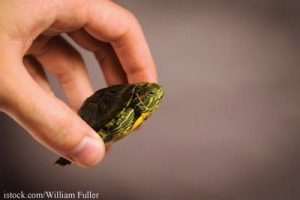Illegal tiny pet turtles continue to cause of Salmonella illnesses across the country. The Centers for Disease Control and Prevention (CDC) reports that eight outbreaks, some of which began in 2011, have sickened a total 371 people in 40 states and the District of Columbia. Sixty two people have been hospitalized. Most of the victims, 70 percent, are children under 10.
 Children are among those who are at particular risk when it comes to Salmonella infection, which is why the Food and Drug Administration banned the sale and distribution of small turtles as pets in 1975. Turtles with shells shorter four inches are illegal to own and should not be purchased or given as gifts.
Children are among those who are at particular risk when it comes to Salmonella infection, which is why the Food and Drug Administration banned the sale and distribution of small turtles as pets in 1975. Turtles with shells shorter four inches are illegal to own and should not be purchased or given as gifts.
Animals that look healthy can carry Salmonella and contaminate what they touch or what touches them. Children under 5 should not be allowed to should be allowed to handle pet turtles, parents should supervise older children who handle animals and make sure they wash children wash hands with warm soapy water when they are done.
Most of the turtles associated with these outbreaks were purchased from street venders. If you have a small turtle and longer want to, do not release it into the wild. In response to the outbreaks last year, Petco announced a buy back program. Call your local store to see if the program is still active, ask your veterinarian or contact an animal shelter.
The outbreaks were each caused by a different strain of Salmonella. Investigations into four outbreaks are ongoing, so more cases can be expected. Symptoms of Salmonella poisoning include, diarrhea, vomiting, fever, and/or abdominal cramps. Hospitalization is required for severe and some infections can be fatal.




